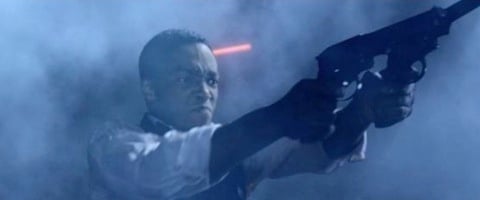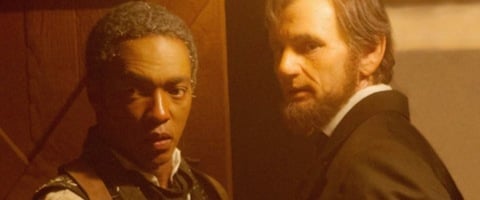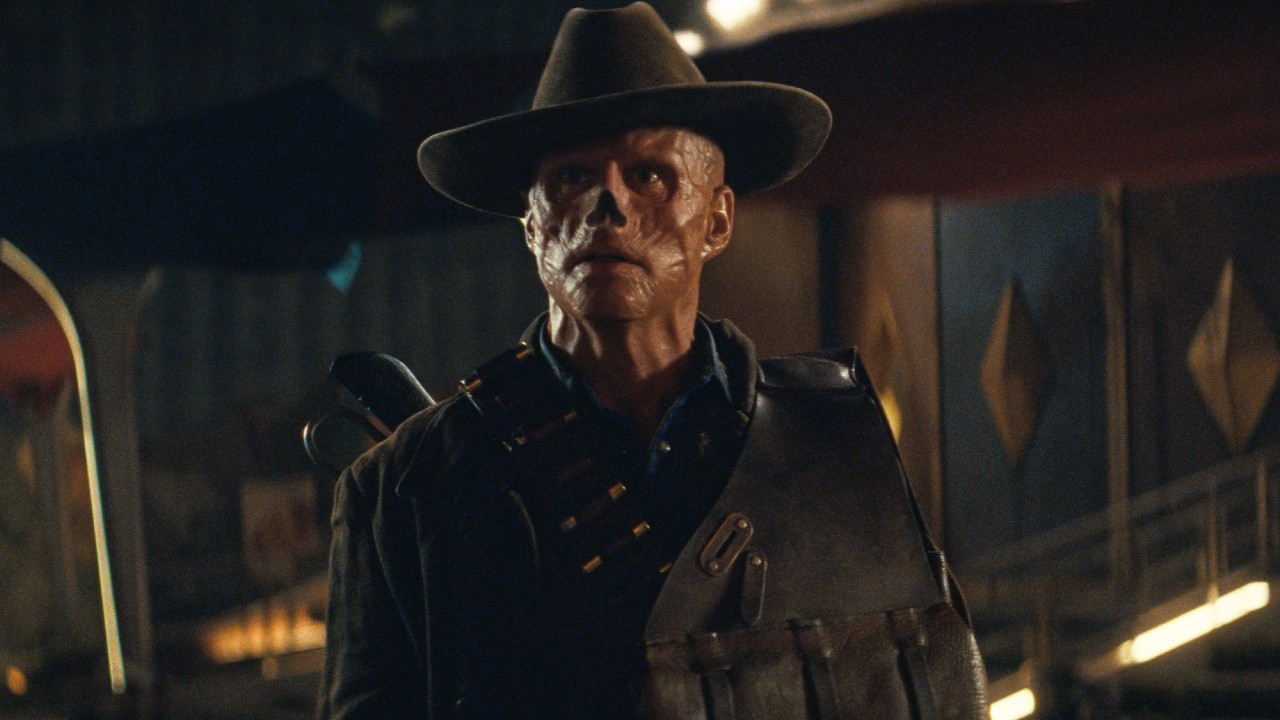
Your Daily Blend of Entertainment News
You are now subscribed
Your newsletter sign-up was successful
Anthony Mackie seriously seems to be everywhere these days. Every time you turn around he's turning in another appealing supporting performance, whether as the mysterious hat-wearing force of fate in The Adjustment Bureau, the robot boxing promoter in Real Steel, or maybe most famously, a charismatic soldier in The Hurt Locker. This weekend he's back lending support to a leading man, but a much more famous leading man than even he's used to. That would be Abraham Lincoln, who in this weekend's Abraham Lincoln: Vampire Hunter spends more time fending off the undead than running the country-- and as Abe's childhood friend Will, Mackie is right there fighting alongside him.
And while director Timur Bekmambetov makes a lot of use of CGI effects, both Mackie and star Benjamin Walker did a ton of their own, extremely physical stunts, which is pretty appropriate for two Juilliard-trained stage veterans who know their way around some stage combat. I talked to Mackie about how he learned to fight for the film, how he chooses every role to be different from the one before, and a little about why he wanted to work with Michael Bay on his new movie Pain and Gain, in which Mackie plays a Miami meathead who conspires to kidnap a rich businessman. We also talk a bit about a long-rumored Tupac Shakur biopic, and why Mackie would be the perfect guy to star in it.
Check out the interview below, and see Mackie in Abraham Lincoln: Vampire Hunter this weekend.
In the behind the scenes footage, it looks like you do a flip in the fight scene at the plantation. Do you actually do that?
I actually do that flip.
Did you learn that for this movie?
I'm not just flipping around my living room! [Laughs] I had a guy I worked with, a stunt guy named Aaron Tony. He's a martial arts and capoeira expert. I mean literally, he went to China and then he went to Brazil and studied with all these gurus. He would come by the house every day and teach me all these moves, during the shoot.
Your Daily Blend of Entertainment News
What's amazing is you're doing that in the background, and Ben's in the foreground swinging the ax. There's so much coordination and choreography. Was it like that in other scenes too?
Yeah, even on the train, when we're fighting there's still vampires coming from both directions. If you see him on the train slicing you see me in the background still fighting off vampires with my gun. It was a complex little ballet we did.
It seems so perfect for you and Ben, both being theater guys. Is it similar to stage combat?
Yeah, stage combat is kick-ass. In movies you can fake it, and in stage combat you're onstage, you have to make it look as real as possible. We both worked with this guy at Juilliard named Felix Ilanov, the chunky Russian from Coney Island. He was an amazing stage combat teacher, and he really taught us how to handle ourselves physically and mentally. He would teach us tai chi and movement and how to control your body.

You've been in movie roles that required physicality, but this seems even harder than a lot of them.
It definitely was, just because Aaron was so beyond what anyone would do in a day to day life. Timur was really all about us doing the stunts because he didn't want to cut away to a double. There are a lot of times in there where you look at it and it's us.
Do you look for that as a film actor, to have more stunts and more physical challenges?
No, I love a good double to come in and take a punch. It all depends, I always look for stuff in a role that's different. I always look for stuff that's interesting and creatively intoxicating in a way. I just don't want to get caught in a web of "I've done this on this movie, why don't I do it in the next movie." It's always fun if you play a gay character in one role, then you play a rapper in the next role, then you play a truck driver in the next role, because it's just different aspects of reality.
And it seems like the industry always wants to say "Well, you were really good in that one thing, so why don't you do that again?"
Exactly. So you have to be willing to say no.
Do you do that a lot?
A lot. After 8 Mile literally every movie was "Hey, man, you wanna rap?" After Half Nelson, "Hey, man, you wanna sell some drugs?"
But as a working actor, at a certain point you have to pay the bills. How do you stay strong in the face of that pressure?
That's where theater comes in. And it depends on how high your bills are. My bills are pretty low! I live a very comfortable, conservative life, and i do that so I don't have to do these random movies just to pay for an $85,000 car. I drive a $20,000 truck.
Is that a decision you made early on, when you first got into film?
Yeah. When I made my first movie, the first thing I did was I took that check and I bought a house. They can't kick me out of here! And that was a decision I made in college, because when you're at Juilliard living off Gray's Papaya and ramen noodles… My dad used to say it's very easy to go from hot dogs to caviar, but it's impossible to go from caviar to hot dogs.
Your dad sounds really smart.
My dad knew what it meant to be poor. So that was something I always tried to say away from.

A lot of times people talk the way you do and are really pretentious about their film choices. But you're doing a Michael Bay movie [Pain and Gain] that sounds fascinating. You don't just do all dramas, or all small films.
Like I said before, they're all different challenges. If you look at the Michael Bay movie, it's a dark comedy, with Mark Wahlberg and Dwayne Johnson and Tony Shalhoub and Ed Harris. If I'm going to do that movie, I'm going to do it with that group of people.
Were they all signed on when you got cast?
It was Dwayne, Mark, myself and then they started adding all the other people. But I met Michael, and I was really fascinated by him when I met him, because he gets such a bad rap. But he makes people look beautiful. He makes Megan Fox look amazing. He's just a quirky dude with an interesting sense of humor, and i feel like he's a director that I wanted to work with.
Did you bulk up for that role?
I did. I went back to 207 pounds. It's been three weeks, so I'm back down to 197. Now it's just balancing body tone-ness with muscle. It got to a point where I couldn't fit any of my shirts. I'm like, "I don't want to be this big, I can't fit in my clothes!" You go and get fitted for a suit for a premiere, and they're like "Dude, you can't wear a jacket." So I've just ben doing my cardio and getting it all off.
Back around the time of Notorious, there was talk about doing a Tupac movie. At this point, could you still play that role? He was 25 when he died…
Well, you know, black don't crack. [Laughs] And the thing about Tupac-- a lot of people didn't really know who Tupac was. I would hate for someone to get the role and not do the homework, just make him the hotheaded rapper who jumps around and spit at photographers, because that's not who he was. Tupac was a chameleon, Tupac was the life of the party-- and to be honest, Tupac was a follower. If he met somebody and he liked them, by the end of the day, he'd be talking like them, dressing like them. He was a really interesting, charismatic character.
R And you've done all the research.
And I know an abundance of people who know him. Talking to them, it's always the same thing. If given that opportunity, I would jump at it in a heartbeat.
